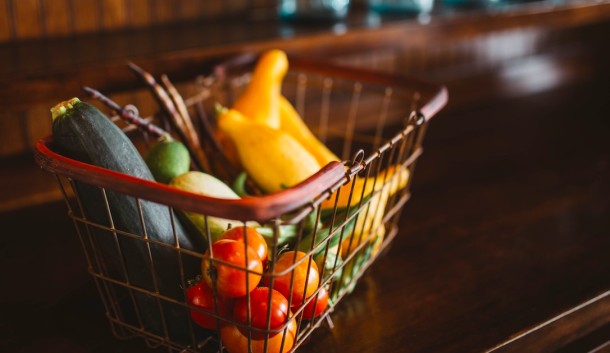Around 85 per cent of Singapore residents eat out at least once a week, with roughly one in 10 eating out every single day, commonly at hawker centres, coffee shops and food courts, according to a release by the National Environment Agency (NEA).
But how will the work from home shift caused by COVID-19 affect our eating habits?
If you’re staying home or eating from your home office more often, we’ve got some simple tips to help you eat well and stay productive in work and life.
Food and productivity – what’s the link?
The food we eat and our lifestyle as a whole can impact how we work more than we probably realise.
Lots of different foods and nutrients work together to help to prevent disease, keep our minds sharp and our bodies energised and optimised – all of which play a role in enabling us to work effectively and efficiently.
A healthy diet also has a role to play in supporting the immune system and helping to defend against infection. This may help to reduce the number of sick days we take over the long-term.
While we are working from home, it’s just as important to eat well for productivity and good health. We don’t have all the evidence on COVID-19 just yet. However, a healthy diet and lifestyle will likely help to reduce the severity of illness and support a faster recovery if we become unwell.
So let’s take a look at foods that help to keep us healthy and productive.
Choose wholefoods first
Focusing on your whole diet will be more powerful in influencing your health, first and foremost, and secondly enhancing productivity, than individual foods or nutrients.
Eating more nutrient-dense foods like whole grains, legumes, vegetables, fruits, nuts, seeds, fish, eggs, lean chicken and meat, and healthy oils is a great place to start.
Try to eat less of the high sugar or processed foods like candy bars, sweet baked goods, soft drinks and fast foods. They can make it difficult to manage weight and don’t contain the nutrients that keep us fighting fit and working hard.
What about brain foods?
You may have heard of the buzz term ‘brain food.’ It’s often used to describe foods with helpful components that influence brain and mental health or function.
Omega 3 fatty acids are a type of healthy fat found in oily fish like salmon as well as walnuts and flax seeds. Omega 3s have been linked with better mood and brain function as we age.
Other brain boosting foods such as berries, green leafy vegetables, nuts and seeds, wholegrains, tea and dark chocolate are beneficial for our heart and other body systems too. This is because food contains lots of powerful components that are good for health, beyond just providing us with vitamins and minerals.
Add more colour to your plate
You can literally eat the colours of the rainbow when it comes to fruit and vegetables. From reds and yellows to oranges and blues – yes all of them!
The vivid colours of fruits and vegetables represent different plant nutrients, called phytonutrients, each with their own health benefits.
Adding more colour to your plate and mixing up the types of plant-based foods you eat each week are great overall health and productivity hacks.
Make the healthy choice the easy choice
Eating well at home doesn’t just happen because we know it’s good for us. We need to have healthy foods close by, and we need to be able to quickly or easily prepare food at mealtimes, when hungry or time-poor.
If you’re eating more meals at home, or if your someone who has help in the kitchen, having healthy food on hand is an important step.
Pre-preparing food means you won’t have to make food-related decisions on an empty cupboard or stomach. These are occasions when we are more likely to choose calorie-dense, high sugar and fatty foods.
It will also cut down the time it takes to prepare food each day, giving you time to be productive, spend time with family or on hobbies and it’ll help you to consume more nutritious foods too.
Eat your way to productivity with these 5 tips
1. Have a plan
This might mean writing a shopping list and pre-planning your meals for the week. Think about the types and amounts of ingredients you’ll need to enable you to prepare each meal and snack.
If you are still eating out regularly, think about the options available at your local food place in advance. Are there healthier options you could consume?
Also in times like this, when getting an online delivery slot is so difficult, pre-planning will help you order in one go, instead of looking for delivery slots and adding to the stress.
2. Dedicate time for meal preparation
For those who don’t have help at home, you might like to choose one or multiple nights during the week to get your lunches and healthy snacks organised for the week or even for just a couple of days in advance. You might make a larger batch of dinner meals like curry, stir-fry, soups and stews that you can reheat at lunchtime. Or, you could cook two meals in one night; one for dinners and one for lunches.
3. Eat mindfully
Try your best to take a break to eat your meals slowly. The better we chew, the better we digest the food and its nutrients. Eating in front of the screens may result in you eating your food fast, and you are more likely to overeat – and feel sluggish. You might feel like you’re saving time at that moment, but you could be affecting productivity at a later stage.
4. Create your own nourish bowls
Pre-preparing ingredients can make it easier to whip up a quick and healthy meal at lunchtime.
You might pre-prepare a batch of brown rice or noodles to add to any veggies you have on hand like carrots, greens or mushrooms. Don’t forget to add protein. It helps you to stay satiated and supports muscle repair. Some quick and easy ideas include canned or pre-cooked legumes, eggs, fish, tofu and chicken, for example.
Extra tip – Add a healthy topping like seeds for extra crunch, a dip, healthy oil or herbs and spices to add nutrition and flavour without the added salt.
5. Keep healthy snacks on hand – but out of reach
If we have snacks sitting on our desk as opposed to in the cupboard, we’ll be more likely to eat them – even if we aren’t hungry. Try to have healthy snacks in your home cupboard and fridge, like fruit and vegetables, dips, yoghurt, nuts and whole grain crackers, for example.
Extra tip – Don’t forget about water, the ultimate brain booster. To get you in the habit, start by keeping a water bottle on your desk or set reminders on your phone to prompt you to get up and have a glass of water while taking a short break.
For more property news, content and resources, check out PropertyGuru’s guides section.
Looking for a new home? Head to PropertyGuru to browse the top properties for sale in Singapore.
Need help financing your latest property purchase? Let the mortgage experts at PropertyGuru Finance help you find the best deals.
This article was written by Nicole Murphy. Nicole is an Australian trained Accredited Practising Dietitian (APD) and content developer, who writes about food, nutrition, health and the environment. When she isn’t working, you’ll find her exploring, dancing and cooking up a storm in the kitchen, usually with too many pots and pans.
Disclaimer: The information is provided for general information only. PropertyGuru Pte Ltd makes no representations or warranties in relation to the information, including but not limited to any representation or warranty as to the fitness for any particular purpose of the information to the fullest extent permitted by law. While every effort has been made to ensure that the information provided in this article is accurate, reliable, and complete as of the time of writing, the information provided in this article should not be relied upon to make any financial, investment, real estate or legal decisions. Additionally, the information should not substitute advice from a trained professional who can take into account your personal facts and circumstances, and we accept no liability if you use the information to form decisions.





